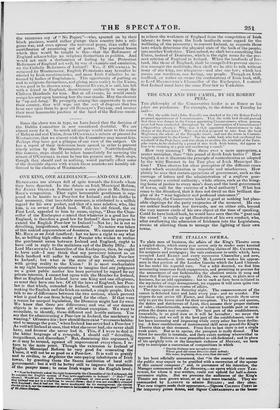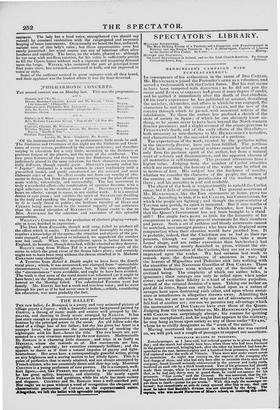THE ITALIAN OPERA.
To plain men of business, the affairs of the King's Theatre seem
a tangled skein, which every year serves only to render more knotted and twisted. First there are the contending claims of Mr. CHAMBERS, his assignees and mortgages; the vain endeavour to settle which, have occupied Lord ELDON and every successive Chancellor; and now, "within a month—a little month," M. LAPORTE makes his appear- ance in that portion of the London Gazette which the Lord Chancel- lor has under his especial care. Not a whit daunted, we find him announcing numerous fresh engagements, and promising to procure for the amusement of our fashionables the choicest artists in song and dance that Europe can supply. All this, we repeat, to plain men of business, has an odd appearance : but to such as have been initiated in the mysteries of stage management, we suppose it will seem quite cor- rect and in the common course of affairs.
The opera opened on Saturday night. The commencement of the season is deferred later and later every year : and no wonder. The singers do not arrive till Easter, and those who precede them serve only to get the house aired for their reception. The kings and queens, the dukes and dutchesses of Lent, then assume their proper stations of valet', chambermaids, assassins, or whatever humble post or occu- pation the drama may require. The best part of the establishment, meanwhile, is as good stow as it will be hereafter : we mean the Orchestra ; and we call it the best part of the establishment, since. it has been increasing and improving while every other has been declin- ing. A finer combination of instrumental skill never graced the King's Theatre than at this moment. From first to last there is not a single weak point. But as to operas, the prospect is really dismal. The thirst for novelty is insatiate, and there exists nothing wherewithal to appease it. ROSSINI is now proscribed as old-fashioned; and in place of his sprightly vein or the luxuriant richness of MOZART, we have- only to anticipate a succession of compositions in which " Ductile Dulness new meanders takes-
- Whose good old cause BILLINI shall defend; His muse, beginning thus, even thus did end."
It has been officially announced, that "in the course of the season- the public may expect to be gratified with a succession of the operas of this eminent composer ;" and, in pursuance of his intention, the Manager commenced with La Straniera,—an opera which even TAM BURINI, for whom it was written, could not uphold for half-a-dozen successive nights. But we presume the audiences of the King's Theatre are now grown wiser, or at least more tractable. They are commanded by LAPORTE to admire BELLINI ; and they obey, Two new singers made their appearance,—Signora CoLrosii Comri as- the temporary prima donna, and Signor CABTAGINOYA as the basso,
cantante. The lady has a loud voice, strengthened (we should say ruined) by constant contention with the congregated and incessant braying of brass instruments. Occasionally we heard the free, unforced, natural tone of this lady's voice ; but these opportunities were but rarely permitted: her usual course was one of laborious effort after loudness and rapidity. The basso, on the whole, pleased us : although he too sang with needless exertion, for his voice is sufficiently potent to fill the Opera-house without such a vigorous and unsparing demand upon the lungs. WINTER, who sustained the part of principal tenor four years since, has returned,—increased in bulk, and not improved in voice or style. Some of the audience seemed in great raptures with all they heard, and their applause was the loudest where it was the least deserved.



























 Previous page
Previous page